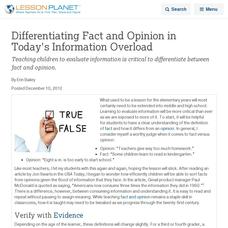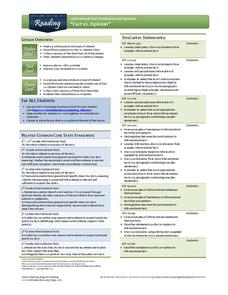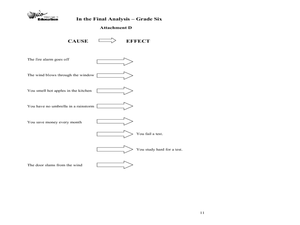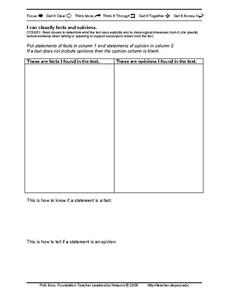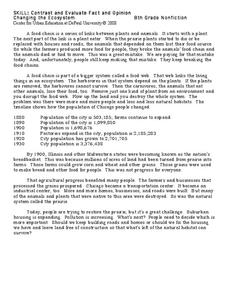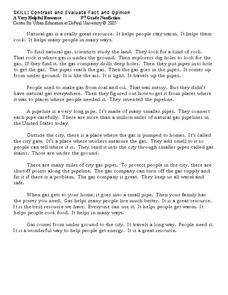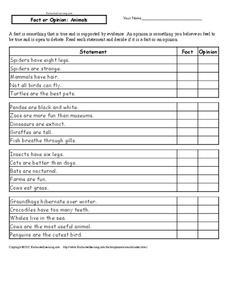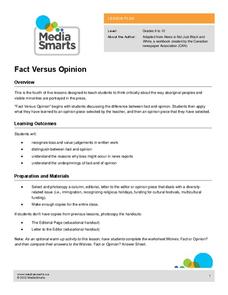The New York Times
News and News Analysis: Navigating Fact and Opinion in the Times
Help your class understand the difference between fact and opinion by exploring the New York Times homepage and articles. In pairs or small groups, pupils complete a scavenger hunt, answering the provided questions. Next, discuss the...
Curated OER
Juggling Fact and Opinion in Today's Information Overload
Teaching children to evaluate information is critical to differentiate between fact and opinion.
Florida Center for Reading Research
Comprehension: Text Analysis, Fact or Opinion Football
Touchdown! Try out this game to help your learners differentiate between fact and opinion. In pairs, pupils switch off reading cards to one another. Learners determine if the sentences on the cards are facts or opinions and continue...
Curated OER
Fact vs. Opinion (Part II)
How can you tell the difference between fact and opinion? Using newspapers, learners determine which articles contain statements of fact, and which articles reflect the writer's opinion. The lesson plan includes a discussion format and a...
Curated OER
Fact or Opinion?
Challenge your class to determine between facts or opinions in the following PowerPoint. Each section contains an advertisement with stated facts and opinions. This is a great game for learners to play individually or with partners.
Curated OER
Is It Fact or Opinion?
Distinguish between fact and opinions in this nonfiction reading instructional activity. Middle schoolers read 'The Diary of an Early American Boy' and work in groups to analyze the text. They record the facts and opinions for the text.
Florida Center for Reading Research
Fact Versus Opinion
Is that a fact or an opinion? Learners explore the difference using this pocket chart activity during which partners read statement cards and determine whether they are facts or opinions.
Curated OER
Eastside Literacy Reading Lesson - Fact or Opinion
Analyze critical thinking skills that involve the ability to distinguish between fact and opinion through self-reflection. Higher education students will collect a newspaper article, advertisement, magazine article, tabloid article,...
E Reading Worksheets
Fact and Opinion - Worksheet: 3
How can you prove a fact? With supporting evidence, of course. Learners read 25 statements and determine if it is fact or opinion. Then, if the statement is a fact, youngsters write a sentence explaining how they can prove it.
For the Teachers
Fact vs. Opinion
Many informational texts are written as factual, but can your learners determine when an opinion is presented as fact? Have your kids read several articles on the same topic and record the statements that contain either facts or...
Curated OER
The Final Analysis: Cause and Effect, Fact and Opinion
Middle schoolers read and review informational texts, analyze cause and effect, and distinguish fact from opinion. They assess a "one-minute mystery" you read aloud for cause and effect relationships. Resource includes complete set of...
Polk Bros Foundation
I Can Classify Facts and Opinions
Telling fact from opinion can be tricky. Direct your class to practice their reading and comprehension skills by taking notes on the facts and opinions in a text. Pupils fill out a two-column chart and write down how they know a...
E Reading Worksheets
Fact and Opinion - Worksheet: 2
After reading a statement, learners decide if it is a fact or opinion. Then, they write a sentence explaining how they know their answer is correct. The sheet contains 25 fact and opinion sentences.
E Reading Worksheets
Fact and Opinion - Worksheet: 5
After reading 25 sentences, individuals decide if they are facts or opinions. Then, they explain their answer in a supporting sentence.
Curated OER
Fact and Opinion Project
Explore fact and opinion in the newspaper with your high schoolers. they will read the newspaper and write down specific information they identify as fact and information that is an opinion. Students draw an art project to...
University of the Desert
Fact and Opinion within the Media
How can the media foster cultural misunderstandings? These activities encourage learners to distinguish between fact and opinion in the media
DePaul University
Contrast and Evaluate Fact and Opinion
How can you tell when an author is expression an opinion or stating a fact? Use two short reading selections to emphasize the difference between a statement that you can prove and one that you can't. The first passage explains food...
DePaul University
Contrast and Evaluate Fact and Opinion
Looking for a resource that helps learners practice identifying fact and opinion? A four-page worksheet includes two informational text reading passages. Pupils read each passage and respond to four multiple choice and one...
E Reading Worksheets
Fact and Opinion - Worksheet: 1
Pupils identify fact and opinion statements with a language arts worksheet. Then, they explain their thinking in a sentence, including the clues or set of words that helped them arrive at their answer.
Curated OER
Fact or Opinion: Animals
How many legs do spiders have? Is that an opinion, or is it a fact? Complete a worksheet with four sets of five questions about different animals and their attributes, noting whether each statement is a fact or an opinion.
Curated OER
Build Mastery: Fact and Opinion
Is it a fact or an opinion? Get your kids up and moving during this reading comprehension activity. They listen to you read a book or passage (consider writing something yourself to get the ideal text), listening for facts and opinions....
Teacher Printables
Just the Facts
Show your class how fascinating a text can be by asking them to focus on interesting facts they learned while reading. There are boxes for six facts as well as one large box where pupils can record the most important fact from their...
E Reading Worksheets
Fact and Opinion - Worksheet: 6
Practice discerning fact and opinion with a worksheet that contains 25 statements. Once learners determine if they are fact or opinion, they circle their answer and write a sentence explaining how they know.
Media Smarts
Fact versus Opinion
Part of a series aimed at breaking down cultural bias from the Canadian Media Awareness Network, this activity identifies where opinions do and don't belong in a newspaper. Pupils review handouts about the purpose of editorial comments...



